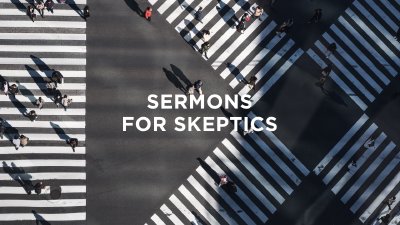Whether faith can include doubt depends on what you mean by faith and by doubt. According to James, faith is not just a set of theological beliefs, but a lived, embodied trust in God that can only come through a personal encounter with Jesus Christ. This personal faith can vary from weak to strong or from little to great, and it always includes some degree of struggle with what we don't know or can't understand. The struggle is what we sometimes call "doubt" or "unbelief." By contrast, the word translated "doubting" in James 1:6 is about hedging your bets, putting some of the weight of your life on God's promises and the rest of it on other sources of hope. This kind of "straddle doubting" forfeits your access to the wisdom of God, which only comes through active trust in the person of God.

Can Faith Include Doubt?
Sermons for Skeptics
October 2, 2022 • Walter Henegar • James 1:5–8
Q&R for Why Hell?
November 20, 2022 • Matthew 25:31–46
Five short responses clarifying the preacher's interpretation of the passage, about whether God can be present in hell, about why faith is the mechanism for salvation, about predestination, and about hopelessness... also three longer responses about how God can hold people accountable if they haven't heard the Gospel, about how there could be no sadness in heaven if people we love aren't there, and about a grab bag of questions generated by reading NT Wright and Karl Barth.
Why Hell?
November 20, 2022 • Walter Henegar • Matthew 25:31–46
The doctrine of hell is repugnant to most people today, yet no one talked about it more than Jesus himself. In his parable-like picture of separating sheep and goats, Jesus shatters our stereotypes about his final judgment and presents a costly vision of how he both saves us and transforms us by grace. Along the way, he gives us some insight into what hell is like, why it exists, and what to do with it.


Q&R for Is Christianity Good for Non-Christians?
November 13, 2022 • Matthew 5:43–48
Three almost identical questions about loving enemies and praying against them; three very related questions about loving “enemies” who are Christians; and three miscellaneous questions about generosity to the poor, other religions and LGBT people



